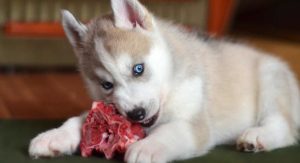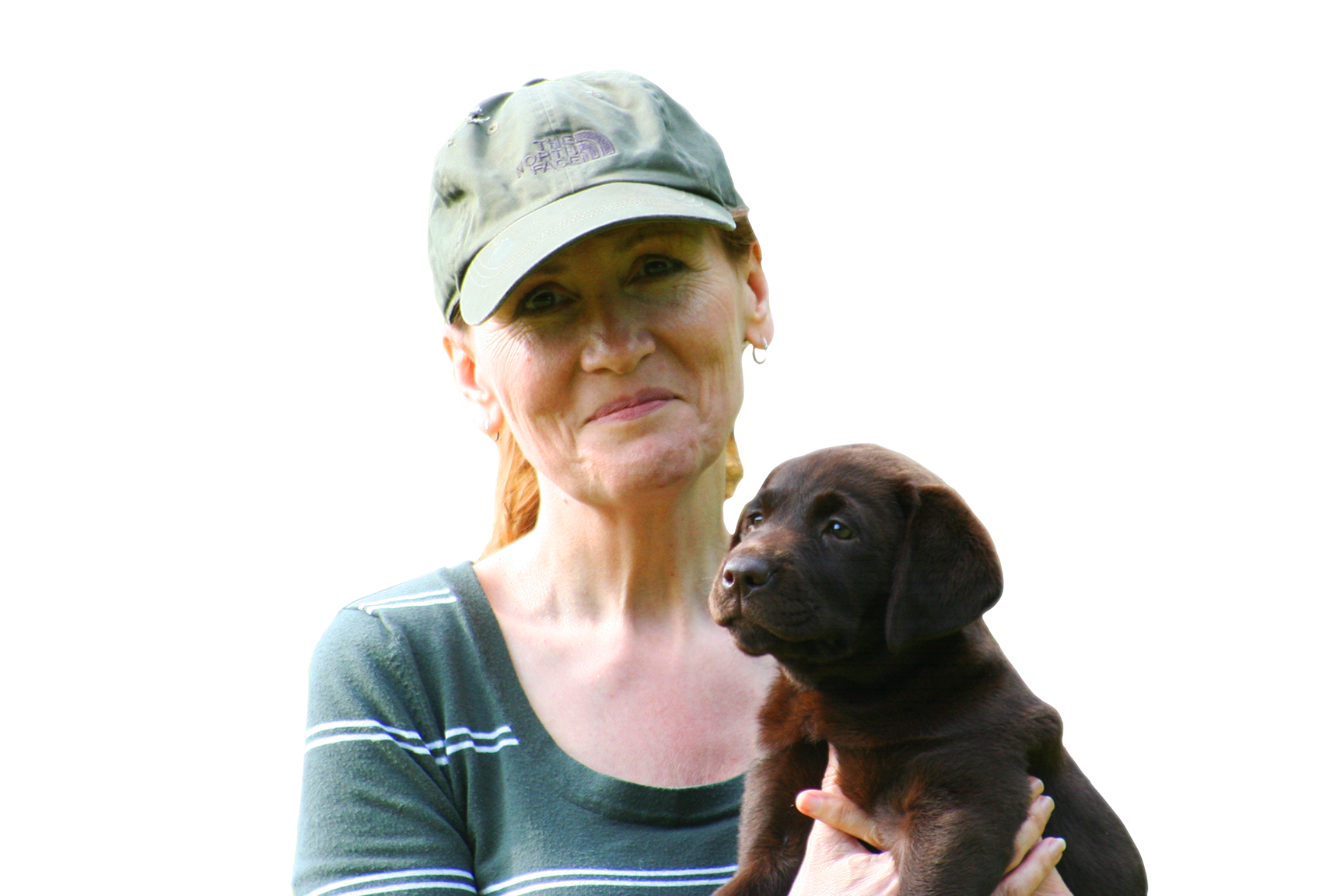Whilst most dogs nowadays feed on commercial kibble, there is a growing interest in raw food for puppies. I have raw fed puppies into adulthood


For puppies to thrive they need good quality food with all the right nutrients for health and growth. Puppies need enough of this food to grow but not so much that they grow too fast.
We’ll be looking at what type of food you should give your puppy. And we’ll also look at how much of it you need to provide and give you some suggestions for feeding schedules and routines.
We’ll look first at the general feeding guidelines that apply to all new puppies. Then at how puppies of different sizes, shapes, and breeds, may vary in the type and quantity of food that they need
Most puppies are fed on commercially produced dry puppy food, also known as puppy kibble. Modern puppy food is convenient, stores well, is great for training and bonding, and is readily available in most parts of the world.
If you are interested in raw feeding your puppy this is an alternative that works very well for some puppy parents. Feeding raw requires some knowledge, freezer space, and a good food preparation protocol. You can follow this link to find out about the pros and cons. And read up on how to go about it, in my article: feeding a puppy on raw food.
Here are some tips to get you started with feeding your puppy on kibble
If you decide to feed your puppy on kibble, you may feel overwhelmed by the range and variation of puppy food available to you. There are grain free kibbles, hypoallergenic kibbles, and many other options to confuse you.
In the first week with your puppy the choice is simple: feed the same food that the puppy was being fed by their breeder.
Most breeders wean their puppies onto a well known brand of dry puppy food and will send you home with several days supply. Use this, and if your puppy has no problems, stick with it for a while. Moving homes is stressful for a puppy and stress can cause tummy upsets in young dogs. The last thing your puppy needs on top of a massive change in lifestyle and family, is a change in diet too.
What To Feed: Key Points
Brands of kibble vary widely in price. Sometimes the difference in cost is misleading as cheaper brands may have a lot more filler in them, and you may actually have to feed larger quantities of food to achieve the same result as a more expensive brand.
If and when you decide to move on from the food that the puppy's breeder gave you, don't worry too much about which brand to pick. Choose a mid range brand and see how you get on with that.
When you collect your puppy at 8 weeks old, they will already have been weaned onto puppy food. Many years ago, before good quality puppy food was available, puppies this age were fed on puppy milk replacements, and fillers such as breakfast cereal. This is no longer considered a necessary or adequate diet for a puppy.
Dry food makes puppies thirsty. Your puppy should have drinking water available at all times during the day. It is fine to take the water away at bedtime provided your puppy has not eaten for a couple of hours. Remember to return the water first thing in the morning.
At one time, rolls of fat on a puppy, were thought to be a good thing. Stored fat provided a reserve that the puppy could draw on if they were too ill to eat. Before vaccines became available this may have been of benefit to some puppies.
Nowadays we know that the disadvantages of being a fat puppy outweigh any benefits. Puppies that are overfed, grow too fast which puts a strain on their joints. And being slim is now widely accepted as the most healthy body shape for a puppy.
How Much Food: Key Points
Weight for weight, some brands are much denser in calories and nutrients than others. As a rule of thumb you should feed your puppy according to the manufacturers instructions as a starting point. Then assess your puppy's condition and adjust quantities if necessary.
You'll find some tips below for making that assessment and your veterinarian will be able to confirm whether or not your puppy is a healthy weight when you visit them for vaccinations.
It's important that you are not guided by your puppy's appetite. Many, if not most, puppies will seriously overeat if fed to appetite.
If your puppy is full of energy, and you can feel but not easily see, their ribs, then your puppy is likely getting enough to eat.
If you can easily see ribs then it's time to increase the manufacturer's recommended daily rations by a quarter for a week or so, and reassess at the end of that time.
If you run your hands down along your puppy's sides you should be able to feel their ribs by pressing gently. Their knobbles on their spine and the tops of their hip bones should not be visible at all. They should be well covered and not easy to feel.
A healthy puppy also has a bit of a waist when viewed from above or the side. If your puppy is much wider in the middle than at their hips and shoulders, and you cannot easily feel their ribs when pressing gently along their sides, the quantity of food recommended by the manufacturer is probably too much for your puppy.
Reduce the daily ration by a quarter for a short period, and reassess every few days.
Eating large portions of food gives many puppies diarrhea. This is the case even with great quality puppy food.
You will need to divide your puppy's daily ration of food into small portions delivered throughout the day. Don't be tempted to put the day's ration down in a bowl and let the puppy help themselves. Many puppies will gorge the whole lot at once.
How Often To Feed: Key Points
Most 8-12 week old puppies need to have their daily food ration divided into at least four portions, spaced three to four hours apart. For example, you could feed your puppy at 7am, 11am, 3pm, and 7pm.
Make sure that the last meal is at least two hours before your bed time. This gives you the best chance that your puppy will last through the night without needing to poop.
Most 3-6 week old puppies need to have their daily food ration divided into at least three portions, spaced five to six hours apart. For example, you could feed your puppy at 7am, 1pm, and 7pm.
After 6 months of age you can divide the daily ration into two portions, and just feed morning and evening.
Our dogs do not even own a food bowl until they are around six months old. We use up all their food in training games.
This works well if you are at home during the day. Divide the puppy's four portions into four small containers with lids and starting from their previous meal time, feed them their kibble as as you play Puppy Games. When you get to the next meal time, give the puppy all the food that is left in the first box. Then repeat with the second box
As you get better at doing this, you'll find you are able to spread the food ration out fairly evenly across the day
This helps to create a brilliant bond between you and your puppy and gets you off to a great start with training
Part of the reason for the bewildering variety of puppy food is that different types of dog may need different types of diet.
Different Diets: Key Points
Food that is manufactured for giant dogs is not the same as food that is manufactured for tiny dogs. And it is not just the size of each piece of kibble that is different.
Different breeds of dog grow at different rates, and as a general rule, larger breeds grow more slowly than smaller breeds. It's important that we enable these correct growth rates because super fast growth can be very damaging for a young dog.
When you purchase your bag of puppy food you'll need to make sure it is the right food for the size of your dog
Very small toy dogs may need to have their daily ration divided into several portions for longer.
Little dogs such as Chihuahuas may struggle to eat larger portions, even as they grow older and are prone to low blood sugar if left for too long between meals
While some flat-faced dogs will cope well with ordinary puppy food, you can buy puppy food that is specifically designed for flat-faced dog breeds such as Pugs and French Bulldogs.
This is usually food that has been designed to be easy to grasp, and may contain ingredients designed to encourage chewing and reduce the dental problems that are common in these breeds. Have a chat with your veterinarian about these options.

Whilst most dogs nowadays feed on commercial kibble, there is a growing interest in raw food for puppies. I have raw fed puppies into adulthood
To read more puppy feeding articles, check out our library of breed specific puppy feeding guides
Recommended: